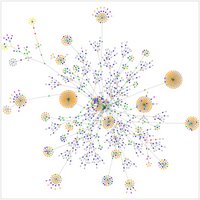Evolution and irony in the yard
Tales from the imperfect rural wife: Chuck had it all wrong in the survival gameThe irony comes from the fact that Chuck did actually consider female choice in evolution, in a rather different context, but more from the fact that dandelions have no sex. They are clonal organisms that reproduce from parts if disturbed. Slash them as much as you like, they will keep coming back. Survival of the most stubborn indeed.
by Paula Cassidy
06.02.06
I had just chopped off their heads, but by the next morning, this lawn full of infiltrators resurrected to full attention, awaiting the next bloody battle, standing there semi-headless, taunting me with their “Darwinian survival of the fittest chant.” Chemical warfare crossed my mind, but my heart leans ever so tenderly to the possibility of a happy, healthy planet and Kyoto Protocol and such—unlike our glorious western leaders who live in some confused environmental denial bubble. The low tech war was on. May the most stubborn species win.
History tells of a carpenter that forever changed our lives. Although golf courses and manicured suburban homeowners may deem him the messiah, this carpenter didn’t wander the lands guiding the spiritual walk of the multitudes. Edwin Beard Budding invented the first lawn mower. His 1830’s patent even touts that country gentlemen would not only be amused by his invention, but would also reap the rewards of a little healthy exercise. Country gentlemen. Right then. To the present, where women rule the powerful motorized riding lawn mower, no longer sitting pretty on the sidelines, sipping lemonade in tight corsets and poofy dresses. Vanity mirror? Forget about it. Who wears lipstick to battle?
I roll my engineless reel mower about thirteen times over the same dandelion stem. The mower was a Mother’s Day gift, but before a mob of sympathetic mothers disperse to lynch my husband, it should be noted that it was a gift I had requested; hindsight brought on by frustration, finds me pining for the sapphire ring or a new toaster. No fuel. No noise. No environmental impact. Great cardio workout. The concept was great on paper, but the reality stood before me, relentlessly clinging to life and limb on acres of grass. I roll over the dandelion one more time, and one more time it bends, side stepping its fate. Stubbornness is something we both had in common. It refused death and I refused the effort to bend over and pull it out. Stalemate.
And without warning, like a trumpet sounding in the high afternoon, I hear the call of the machine—the lure of the green John Deere, parked alone and abandoned in the barn, inside the mechanical perimeters of my husband’s fleet of un-environmentally friendly toys and gadgets. Now the dilemma. Stick to my ecological and heart healthy guns, or cave like a hypocritical jellyfish so I can kill me some dandelions real fast-like, and get on with my day. What’s a girl to do?
“You want to use the riding mower, don’t you? Taking too long, eh?” Ah, thank goodness for sarcastic husbands, because without them, how would we women justify our intrinsic stubbornness. Farewell green champion, may you sit idly in the barn, for destiny calls me to the front yard. My clipping shears in hand, I head into battle, the last samurai, facing each adversary one-on-one, with the mutual respect of a true warrior. Snip. Snip. Snip. Our man Charles Darwin got it all wrong, because he failed to consider the female fight for equality. Fittest? No way. Survival of the “stubborn-est” is the best insurance for species predominance.
Moreover I sometimes suspect that the reason why humans have culture is because they have mothers who insist that there is only one right way to do things (even when you are in your 50s), acting as a cultural brake against change. Think of mothers as a kind of memetic repair mechanism...






